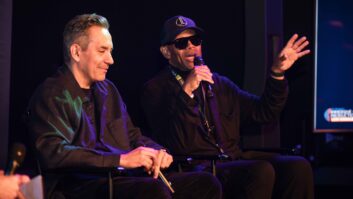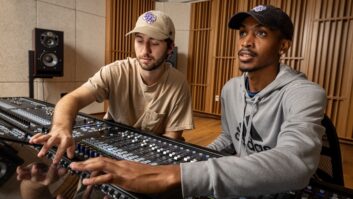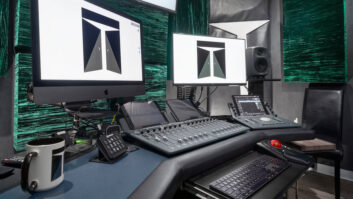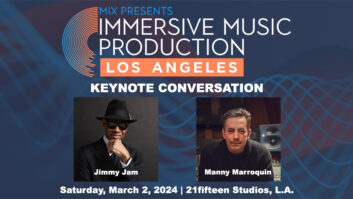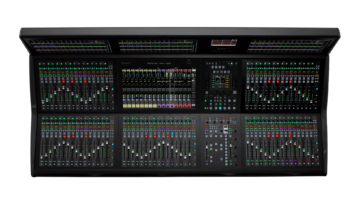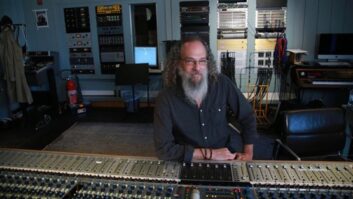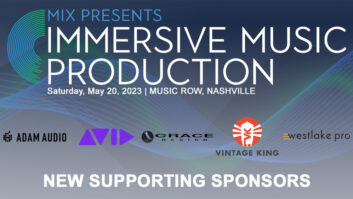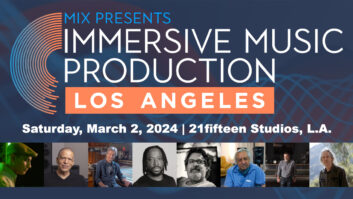Winston Salem, NC–Having tripled its enrollment from 2,000 to nearly 6,000 students in just six years, Winston-Salem State University in North Carolina is one of the fastest growing institutions of higher education in the country. The Fine Arts department and Music Business area are sharing in that success, and every year, more students are obtaining their degrees in Music Business Management and Merchandising, among the department’s many other emphases. Like other programs at the university, the Music Business program has charted an ambitious expansion that will both deepen its current mission and expand that mission to new realms.
To turn the Music Business program’s ambitions into reality, the department hired Tony Artimisi as coordinator of music business and instructor of percussion. The program already owned a recording studio with a large control room and three tracking rooms, but its acoustics were sub-par and its equipment was badly in need of updating. Because many of the program’s students aspire to careers in production and engineering, and because the program is planning to offer a recording emphasis in 2008, Artimisi knew that he had to overhaul the studio.
“Our vision is that Winston-Salem will be one of the premier recording schools in the country,” said Artimisi. “To get things started, I submitted an ambitious proposal for studio renovation. I initially shot for the moon, thinking that some things would have to come out. To my surprise, it was fully funded!”
After a radical upgrade for new ceilings and acoustical treatments, new equipment received the next-largest allocation of funds. API mic pres and equalizers form a world-class front-end for the newly renovated signal chain. Specifically, Artimisi requested five API 3124+ mic pres, two API 550A discrete three-band EQs, and twenty-two API 550B four-band EQs. The 3124+ features four channels of API’s legendary mic preamplification with the API 2520 OpAmp, mic/line inputs, pads, polarity-reversal, and phantom-power. The 550A is an exact replica of API’s classic all-discrete circuitry EQs made famous on their consoles of the 1960s and 1970s. The 550B is a continuation of the original design.
“Since I’m a drummer, I know how great drums sound through API gear,” said Artimisi. “But beyond that, I decided to go with an API front-end in consultation with two respected members of my National Advisory Board. Mark Moffatt and Dave Martin both agreed that students would benefit most by training their ears to hear the truly professional sound of API – the sound that made so many of the hit records over the last 40 years! In addition to API, I also need to thank Duncan Rowe at Primal Gear for all of the hard work he put into this project as well. He consulted on the purchases, as well as helping me find vendors that could deliver the gear on time.”
Although Artimisi purchased a Toft ATB 32 console – from the maker of the Trident – he admitted that it will mainly be used for summing and headphone cues. The signal will then pass through an Apogee Rosetta 200 direct to CD. “We may use the pres on the Toft here and there, just to hear the difference,” he said, “but with our API front-end, there’s not much reason to use anything else.” The analog gear, along with plenty of outboard effects and dynamics, will interface with the studio’s Nuendo computer-based recording system via Alesis HD24XR converters and an RME HDSP 9652 card.
The new studio will see immediate use in the fall 2007 semester with Intro to Recording and Studio Recording Techniques 1 & 2. As the program expands, it will offer additional, more specialized, recording classes, along with acoustics and post-production courses.
For more information on API, visit www.apiaudio.com. For more information on the school, visit www.wsu.edu.
